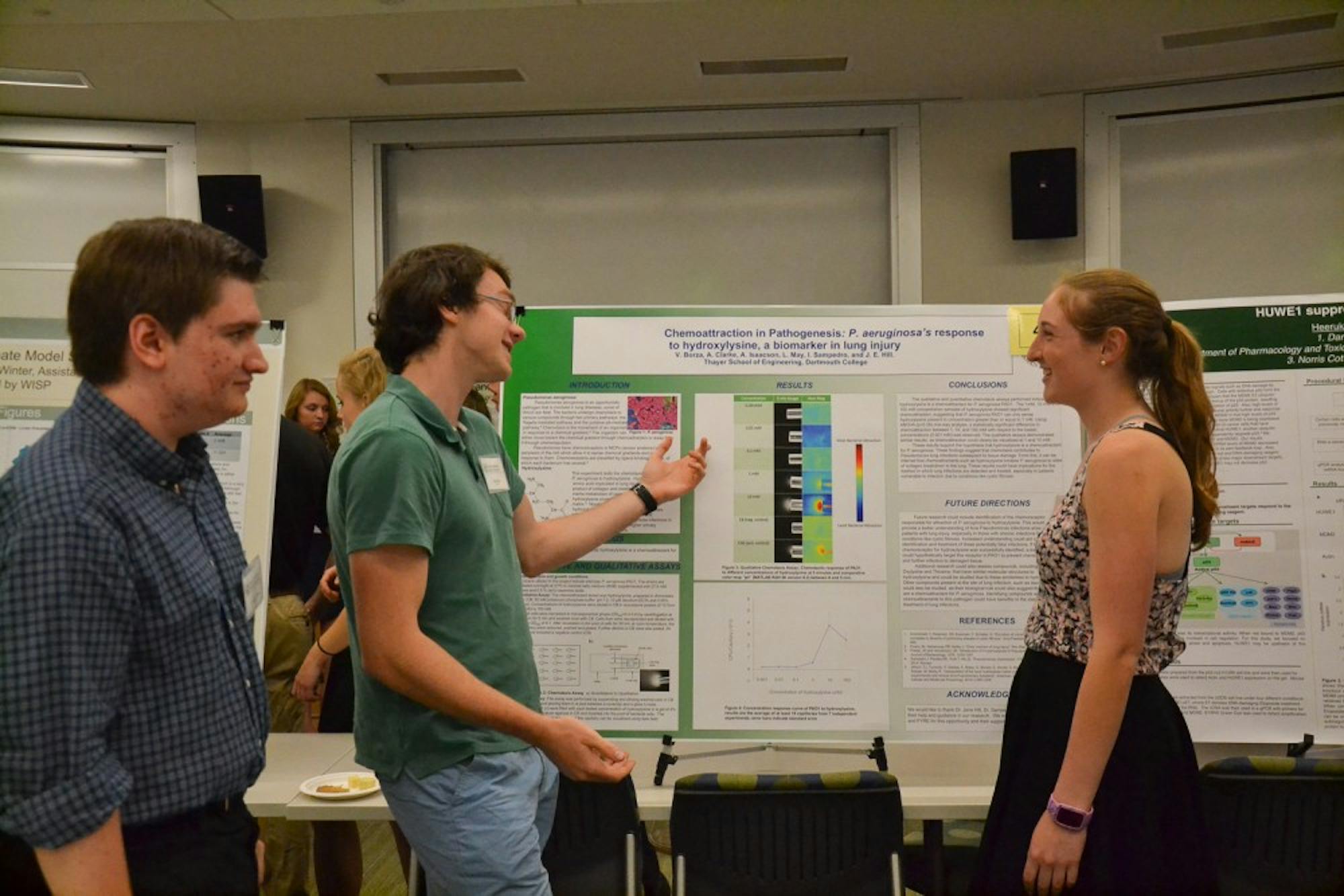The College held its 24th annual Karen E. Wetterhahn Science Symposium in the Life Sciences Center on Thursday, with 232 students participating — the highest number in the symposium’s history — and 176 poster presentations, undergraduate advising and research assistant director Kathy Weaver, who coordinated the symposium, said.
The symposium is open to the public each year and showcases student research, as well as a keynote address given by a successful woman in science in a different field each year. This year’s keynote speaker was Kathleen White, lead for the Climate Preparedness and Resilience Community of Practice in the U.S. Army Corps of Engineers, who spoke about climate change and engineering.
Since its establishment in 1992, the symposium has increased significantly, from hosting 40 presenters its first year to this year’s 232, outgrowing its former venues of Alumni Hall and Fairchild Hall, Weaver said.
Weaver said student poster presentations help students realize their accomplishments through verbal and written engagement with a broader audience.
“The symposium is a real celebration,” she said. “It is about inspiration, raising awareness, raising levels of science literacy and encouraging the next generation of scientists.”
The symposium began with the recognition of undergraduate student faculty mentors who advised student presenters’ research processes, followed by the presentation of awards for student research and White’s keynote address. The symposium concluded with a poster session where students stood by their posters and answered questions from symposium attendees.
During this year’s address, White spoke about climate change, mainly pertaining to projected precipitation levels, rise in sea levels and the prevalence of floods and droughts. She discussed the need for people to be realistic about climate change rather than too pessimistic or optimistic. White said that the world has the ability to make the changes that need to be made to stop drastic climate change.
White concluded with career advice for undergraduate students planning to go into the scientific fields.
“If I am not making mistakes, then I am not taking enough risks to make a difference,” White said in her speech.
She emphasized the importance of challenging oneself and one’s standards during a career.
This year, the winner of the symposium’s inaugural Library Research in the Sciences Award was Annie Fagan ’15, whose senior honors thesis was on the tropical dry forest streams across a land-use gradient in Costa Rica. Lora Leligdon, librarian at Kresge Physical Sciences Library and organizer of the award, said that the competition, new this year and judged by a panel of College librarians, was meant to encourage students to reflect on the research and inquiry components of their scientific question.
“We want to hear about the student’s reflective learning process,” she said. “We want to see them connect their library research with scientific research.”
The other award presented during the symposium was the Christopher G. Reed Science Competition Award, which was sponsored by the Dartmouth chapter of scientific research society Sigma Xi and honors outstanding scientific research by college seniors. Because of their extensive research and intense work, all participants in this competition were nominated for associate membership in Sigma Xi, chemistry professor and Sigma Xi Dartmouth chapter president Dean Wilcox said when presenting the award. This year’s winner was Nina Maksimova ’15 whose senior honors thesis was on chiral gravitational wave production in gaugeflation.
Along with recognizing student scientific research and achievement, the symposium also recognizes professors for their role in the mentoring process.
Ajay Kannan ’15, a second-place winner in the Christopher G. Reed Science Competition, said that professors at the College make it easy to dive into the research process, which he described as a key aspect of Dartmouth’s appeal.
Elizabeth Morse ’15, a participant in the symposium, also said Dartmouth’s undergraduate research attracted her to the College.
“The research opportunities are one of the reasons that I came to Dartmouth,” she said. “Being at Dartmouth, I was able to get involved from my freshman winter and I have been involved ever since.”
Research engineer in the physics and astronomy department David McGaw ’85, who attended the symposium, said he always enjoys the event because of the keynote address and for the opportunity to see the depth of the research and what students are working on.
The symposium is held annually in honor of the late Karen E. Wetterhahn, former chemistry professor and cofounder of the Women in Science Project at the College.




